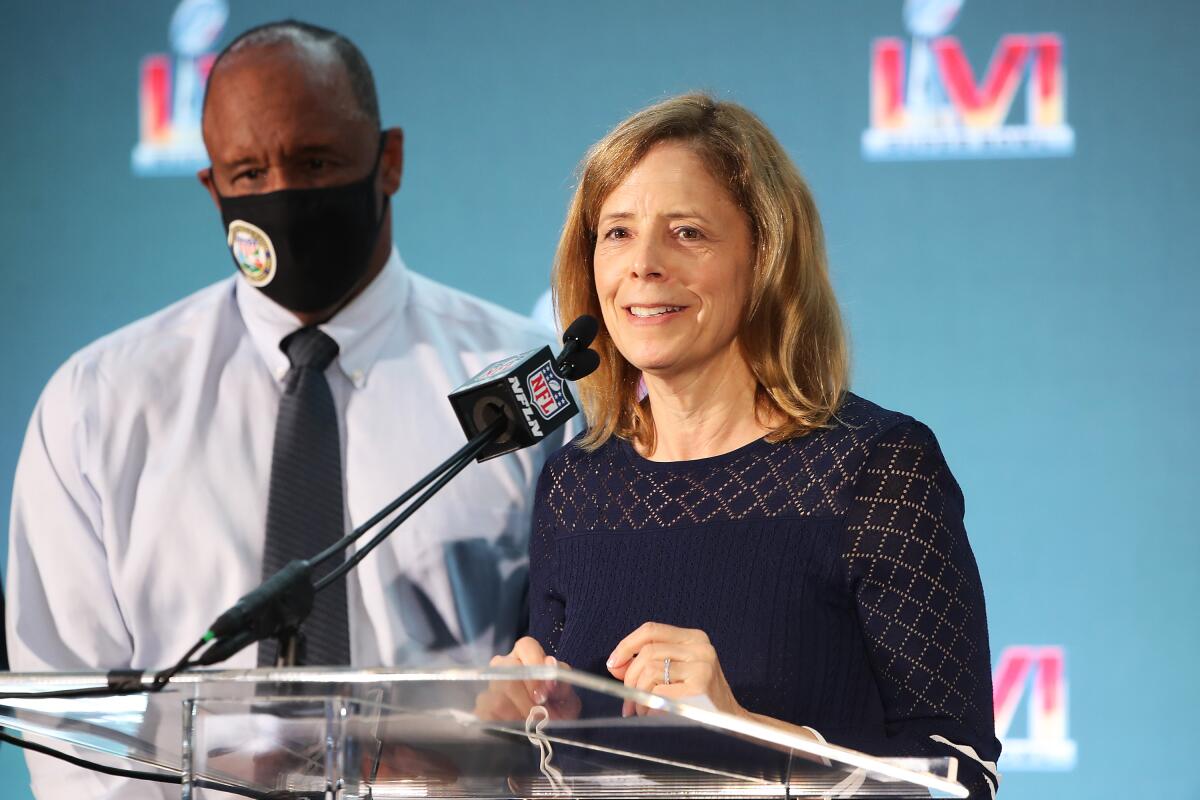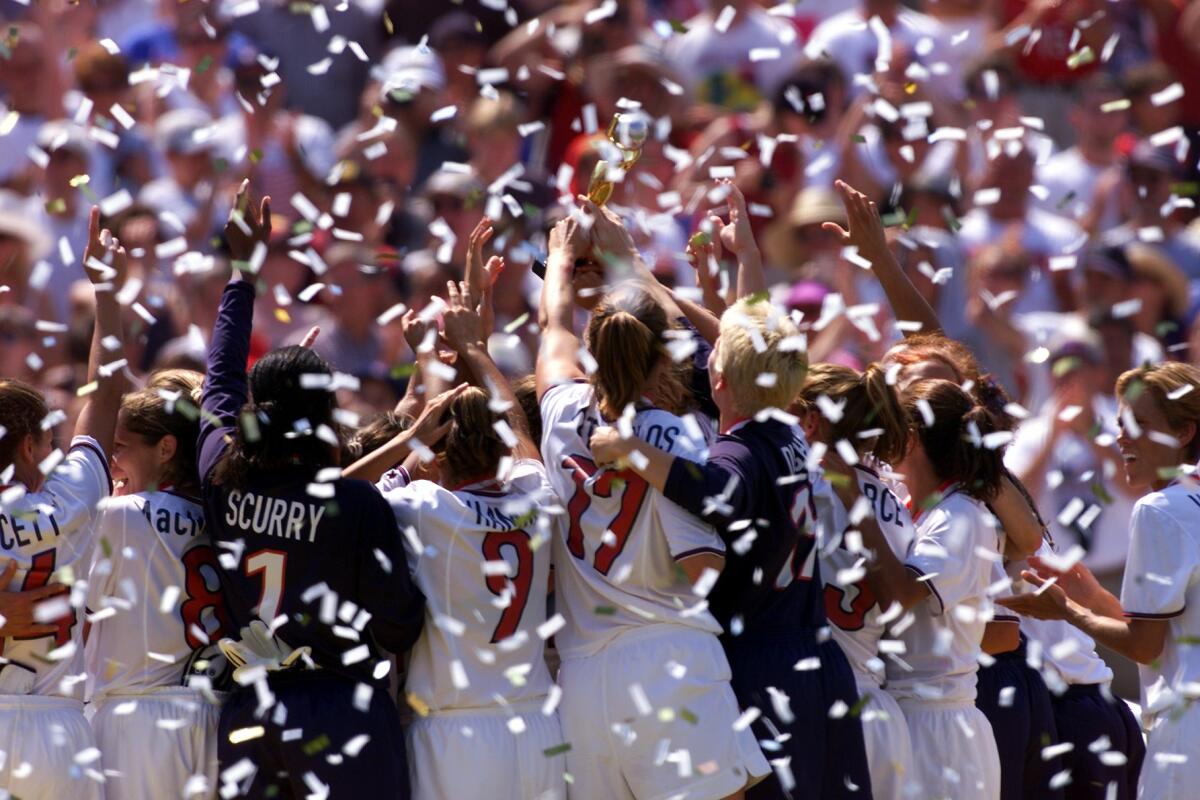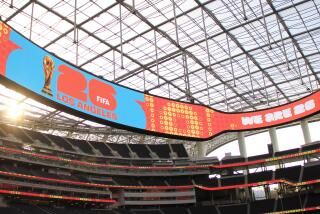FIFA tries to remind a sports-spoiled L.A. that World Cup is on the horizon

- Share via
The World Cup will be back in Los Angeles in a little more than three years, and if you haven’t got that marked on your calendar yet, you’re not alone.
“We are a little bit — I don’t know if jaded is the right word — because of everything that goes on in this market,” said Larry Freedman, co-president of the Los Angeles World Cup host committee. “We just had a Super Bowl. We just had the college football championship. The Lakers are in the Western Conference finals.”
So FIFA, global soccer’s governing body, held a star-studded party Wednesday at the Griffith Observatory to remind everyone the 2026 World Cup is on the way by unveiling the branding for the largest and longest tournament in history, one that will be shared by the U.S., Mexico and Canada. The tournament is also the first in which each of the 16 individual host markets, including Southern California, will have its own unique logo and brand, with patterns and colors that reflect those markets.
Those will be revealed officially Thursday.
“People don’t know it’s coming yet. Hence the launch,” said Kathryn Schloessman, president and chief executive of the Los Angeles Sports and Entertainment Commission.

Several iconic Southern California landmarks, including Dodger Stadium, SoFi Stadium, the Santa Monica Pacific Wheel, the Memorial Coliseum, City Hall and the pylons at Los Angeles International Airport, were illuminated Wednesday with colors from L.A.’s World Cup logo, colors organizers say will slowly become ubiquitous around Southern California as the tournament draws closer.
The logo, which borrows its future-facing look and design — a stylized “26” set behind the World Cup trophy — from FIFA’s global brand, uses a bold palette of yellow, red and blue that represent the Southern California sunshine, stars and beaches.
“Los Angeles is an important city,” FIFA President Gianni Infantino said as he made his way into Wednesday’s event. “It is an entry hub. The city where the final of the last World Cup in the United States was played as well.
“We don’t know yet where the final of this World Cup will be played. This is still up for grabs, so to say. But Los Angeles will be one of the important cities of this World Cup definitely.”
Southern California’s host venue, SoFi Stadium in Inglewood, is expected to be the site of five to eight World Cup games in 2026, Schloessman said, resulting in an economic impact of nearly half a billion dollars, according to a study conducted by Boston Consulting Group. The 1994 tournament, the only previous men’s World Cup played in the U.S., was the most successful in history, drawing a record 3.6 million fans to 52 matches played in nine U.S. cities — turning a profit of $1.45 billion.
“We’re obviously excited about that number. It means a lot,” Schloessman said of the economic impact in 2026. But “what people really do care about is the community impact and what it’s going to bring. And I think that’s what we’re most excited about, having a three-year runway, having this incredible event that gets so much media attention and excitement around it.”
The 2026 tournament will be twice as big as 1994, with 48 teams and 104 matches. FIFA is expected to release the schedule in September, and Freedman said he’s hopeful Southern California, which staged the finals of both the 1994 men’s World Cup and 1999 women’s World Cup at the Rose Bowl, will again be awarded important matches.

“We want to be not only a host city, but a premier host city,” Freedman said. “Whether that’s [an] opening match that will feature the U.S. national team or it’s semifinals, final, we want to be a meaningful participant in the tournament and have some of the biggest matches.”
The fact FIFA chose L.A. for Wednesday’s tournament brand reveal is a sign the organization is taking the market seriously, Schloessman said.
“If you want to get a lot of attention on your brand, you come to the entertainment capital of the world. And that’s certainly Los Angeles,” she said. “That’s why they chose our city to launch it. The entertainment industry and being in a big media city like this is important to their future. That’s the message that they’re sending.”
In addition to staging games, Southern California will serve as a training base for several teams in 2026 and will host a six-week fan fast to keep the city engaged.
“It’s going to be 40 [to] 45 days of World Cup soccer here in Los Angeles,” Schloessman said, “either through the watch parties or through our live matches.”
More to Read
Sign up for Essential California
The most important California stories and recommendations in your inbox every morning.
You may occasionally receive promotional content from the Los Angeles Times.











